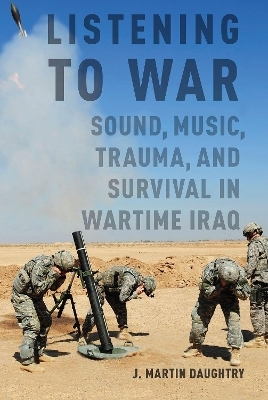
Listening to War
Oxford University Press Inc (Verlag)
978-0-19-088783-4 (ISBN)
To witness war is, in large part, to hear it. And to survive it is, among other things, to have listened to it--and to have listened through it.
Listening to War: Sound, Music, Trauma, and Survival in Wartime Iraq is a groundbreaking study of the centrality of listening to the experience of modern warfare. Based on years of ethnographic interviews with U.S. military service members and Iraqi civilians, as well as on direct observations of wartime Iraq, author J. Martin Daughtry reveals how these populations learned to extract valuable information from the ambient soundscape while struggling with the deleterious effects that it produced in their ears, throughout their bodies, and in their psyches. Daughtry examines the dual-edged nature of sound--its potency as a source of information and a source of trauma--within a sophisticated conceptual frame that highlights the affective power of sound and the vulnerability and agency of individual auditors. By theorizing violence through the prism of sound and sound through the prism of violence, Daughtry provides a productive new vantage point for examining these strangely conjoined phenomena. Two chapters dedicated to wartime music in Iraqi and U.S. military contexts show how music was both an important instrument of the military campaign and the victim of a multitude of violent acts throughout the war. A landmark work within the study of conflict, sound studies, and ethnomusicology, Listening to War will expand your understanding of the experience of armed violence, and the experience of sound more generally. At the same time, it provides a discrete window into the lives of individual Iraqis and Americans struggling to orient themselves within the fog of war.
J. Martin Daughtry is an associate professor of ethnomusicology and sound studies at New York University. His work centers on acoustic violence; voice; listening; sound studies; the Iraq war, and musics of the Russian-speaking world. Daughtry is co-editor, with Jonathan Ritter, of Music in the Post-9/11 World (Routledge 2007), and has published essays in Social Text, Ethnomusicology, Music and Politics, Russian Literature, Poetics Today, and a number of edited collections.
Dedication
Note on Transliteration
Introduction: Composing Thoughts on Sound and Violence
-In Lieu of an Epigraph: Sound-centered Memories of Operation Iraqi Freedom
-The Belliphonic
-Intellectual Predecessors
-A Necessary Detour
-Approaches and Challenges
Fragment #1: The Presence of Mind to Save an Ear: Ali's Story
Section I: Sonic Matériel
Chapter 1: Belliphonic Sounds and Indoctrinated Ears: The Elements of Wartime Audition
-Charting the Belliphonic
-Listening, Structure, and Positionality
-Vehicular Sounds
-Communications
-Civilian Sounds
-Weapons
Chapter 2: Mapping Zones of Wartime (In)audition
-The Zone of the Audible Inaudible
-The Narrational Zone
-The Tactical Zone
-The Trauma Zone
-A Complicating Factor: Iraqi Civilian Auditors
-Another Complicating Factor: Sound and Psychological Trauma
-Conclusion
Fragment #2: Stealth and Improvisation in the Desert: Jason's Story
Fragment #3: Loudly Searching in the Resonant Darkness: The Anatomy of a Nighttime House Raid
Section II: Structures of Listening, Sounding, and Emplacement
Introduction to section II
Chapter 3: Auditory Regimes
-Ideals of Military Audition
-National Audition
-Oblique Indoctrination of Belliphonic Ears
-Situational Awareness
-The Inclusive Auditory Regime of Iraqi Civilians
-Auditory Literacy, Competence, Virtuosity
-Incommensurability
Chapter 4: Sonic Campaigns
-Sound (and Violence)
-Violence (and Sound)
-The Omnidirectionality of Sound and Violence
-Sonic Campaigns
Chapter 5: Acoustic Territories
-Emplacement, Displacement, Transplacement
-Sound and Territoriality
-The Virtual Acoustic Territory of Recorded Sound
-The Radiant Acoustic Territories of Wartime
-The Resonant Acoustic Territories of Baghdad
-The Resonant Acoustic Territory of the body
-Life at the Intersection of Regime, Campaign and Territory
Fragment #4: Fatal Mishearing
Section III: Music, Mediation, and Survival
Chapter 6: Mobile Music in the Military
-Introducing the Wartime iPod
-A Century of Recorded Music on the Battlefield
-iPods in the Iraq War
-Amping Up, Staying Focused, Cooling Down: Technologies of Self-regulation in Combat
-Moving Bodies, Loosening Tongues, Adjusting Crosshairs: Technologies for Manipulating Others in Combat
-Concluding Thoughts
Fragment #5: From "Hell's Bells" to "Silent Night": A Conversation about Music in the Military
Fragment #6: Keeping the Music Turned Down Low: Shymaa's Story
Chapter 7: A Time of Troubles for Iraqi Music
-Iraq's Musical Legacy
-Post-invasion Challenges
-Political Violence
-Sectarian Violence
-U.S. Forces Targeting Music
-The Attenuated Acoustic Territory of Iraqi Musical Practice
Conclusion: The Amplitude of Violence
Fragment #7: Listening as Poiesis: Tareq's Story
Acknowledgments
Glossary
Works Cited
Index
| Erscheinungsdatum | 25.09.2020 |
|---|---|
| Verlagsort | New York |
| Sprache | englisch |
| Maße | 231 x 155 mm |
| Gewicht | 544 g |
| Themenwelt | Kunst / Musik / Theater ► Musik ► Musiktheorie / Musiklehre |
| Kunst / Musik / Theater ► Musik ► Pop / Rock | |
| ISBN-10 | 0-19-088783-4 / 0190887834 |
| ISBN-13 | 978-0-19-088783-4 / 9780190887834 |
| Zustand | Neuware |
| Haben Sie eine Frage zum Produkt? |
aus dem Bereich


